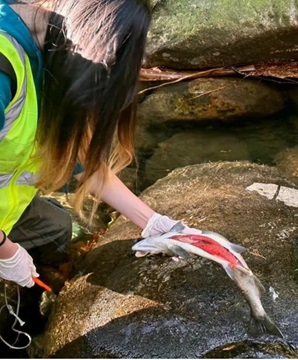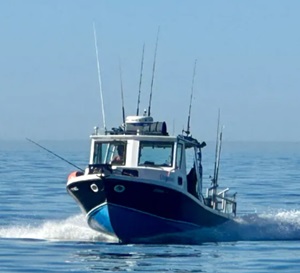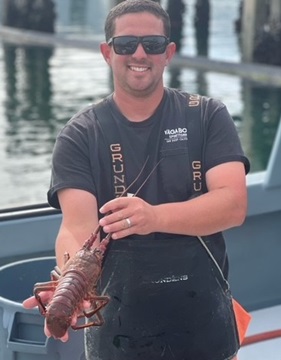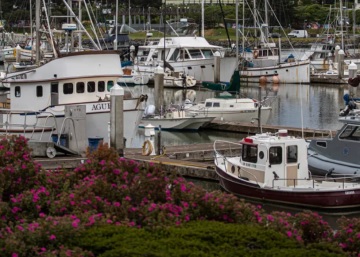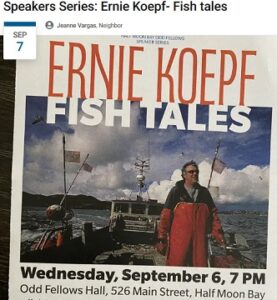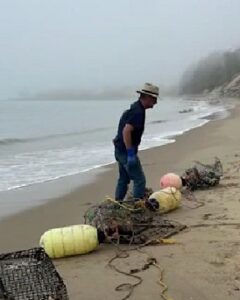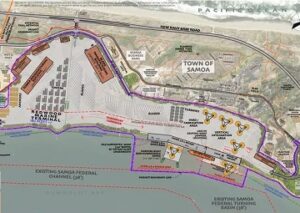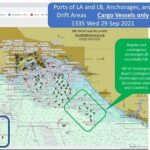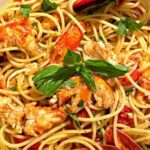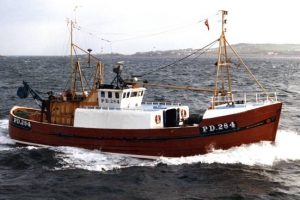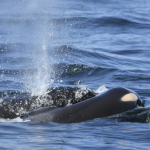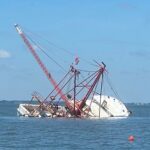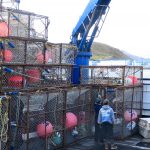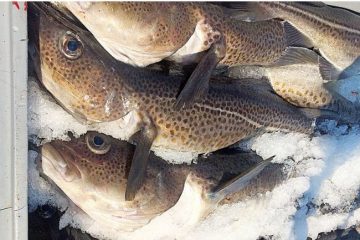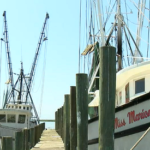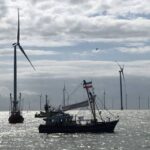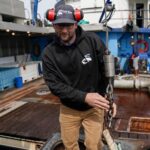Tag Archives: California
Commercial Dungeness crab season delayed by California Fish and Wildlife
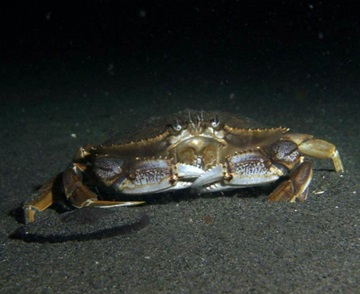 The California Department of Fish and Wildlife on Friday delayed the opening of the commercial Dungeness crab season, citing the need to protect humpback whales and other ocean life from entanglement. The delay — which will remain in effect until further notice — affects the taking and possession of commercially-caught Dungeness crab for 200 nautical miles extending from the California coastline. Additionally, a fleet advisory is in effect for recreational Dungeness crab, reminding fisheries to maintain best practices. The next risk assessment is scheduled for around Dec. 7. Friday’s decision falls on the heels of a late October call by the department to restrict recreational and commercial crab fishing in the state. >>click to read<< 09:01
The California Department of Fish and Wildlife on Friday delayed the opening of the commercial Dungeness crab season, citing the need to protect humpback whales and other ocean life from entanglement. The delay — which will remain in effect until further notice — affects the taking and possession of commercially-caught Dungeness crab for 200 nautical miles extending from the California coastline. Additionally, a fleet advisory is in effect for recreational Dungeness crab, reminding fisheries to maintain best practices. The next risk assessment is scheduled for around Dec. 7. Friday’s decision falls on the heels of a late October call by the department to restrict recreational and commercial crab fishing in the state. >>click to read<< 09:01
Fish and Game Commission Suspends and Terminates Fishing Privileges for Two Southern California Commercial Lobster Fishermen
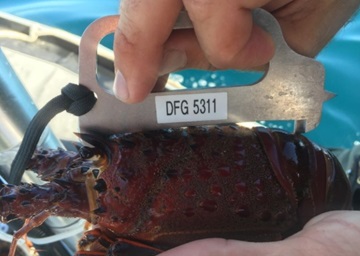 During its Oct. 12 meeting, the California Fish and Game Commission adopted recommendations from the California Department of Fish and Wildlife (CDFW) to revoke the commercial fishing licenses of two Southern California commercial fishermen, Michael Volaski and Arthur Esparza. CDFW recommended a five-year suspension of Volaski’s lobster operator permit and commercial fishing license. Volaski is a commercial lobster fisherman from Oxnard. The revocation stems from a three-day hearing in front of an administrative law judge who listened to testimony from Volaski and CDFW regarding Volaski’s history of violations in the lobster fishery. >>click to read<< 09:53
During its Oct. 12 meeting, the California Fish and Game Commission adopted recommendations from the California Department of Fish and Wildlife (CDFW) to revoke the commercial fishing licenses of two Southern California commercial fishermen, Michael Volaski and Arthur Esparza. CDFW recommended a five-year suspension of Volaski’s lobster operator permit and commercial fishing license. Volaski is a commercial lobster fisherman from Oxnard. The revocation stems from a three-day hearing in front of an administrative law judge who listened to testimony from Volaski and CDFW regarding Volaski’s history of violations in the lobster fishery. >>click to read<< 09:53
Fish to Families: San Diego fishermen and chefs team up to fight hunger
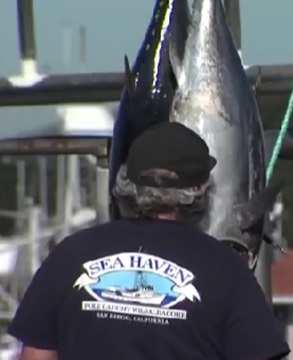 An innovative program called “Fish to Families” has local fishermen and chefs teaming up to help San Diegans struggling with hunger. The San Diego Fishermen’s Working Group originally spearheaded the program in 2020 to help both the community and the fishermen since the restaurants were shut down. “We were able to work, and they were able to put a high-quality meal for somebody less fortunate, and it blossomed from there,” Arthur Lorton, owner and operator of the “Sea Haven” fishing boat, said. The program was recently restarted, thanks to a grant from The Parker Foundation, to help the growing number of people in need. Video, >>click to read<< 09:26
An innovative program called “Fish to Families” has local fishermen and chefs teaming up to help San Diegans struggling with hunger. The San Diego Fishermen’s Working Group originally spearheaded the program in 2020 to help both the community and the fishermen since the restaurants were shut down. “We were able to work, and they were able to put a high-quality meal for somebody less fortunate, and it blossomed from there,” Arthur Lorton, owner and operator of the “Sea Haven” fishing boat, said. The program was recently restarted, thanks to a grant from The Parker Foundation, to help the growing number of people in need. Video, >>click to read<< 09:26
California commercial Dungeness crab fishing season delayed
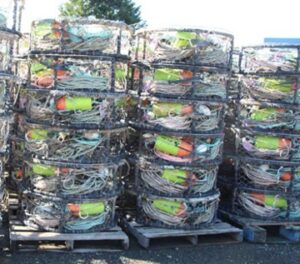 The California Department of Fish and Wildlife announced a delay in the season opener for California commercial Dungeness crab fishing off the Central and Southern Coast to protect whales from entanglement. The decision is based on a combination of excessive humpback whale entanglements in California Dungeness crab gear over the last three years and high numbers of recent humpback whale sightings off the central coast according to CDFW’s Risk Assessment and Mitigation Program criteria. Due to number of entanglements, NMFS is proposing to upgrade the California commercial Dungeness crab fishery to a Category I fishery,,, >>click to read<< 08:09
The California Department of Fish and Wildlife announced a delay in the season opener for California commercial Dungeness crab fishing off the Central and Southern Coast to protect whales from entanglement. The decision is based on a combination of excessive humpback whale entanglements in California Dungeness crab gear over the last three years and high numbers of recent humpback whale sightings off the central coast according to CDFW’s Risk Assessment and Mitigation Program criteria. Due to number of entanglements, NMFS is proposing to upgrade the California commercial Dungeness crab fishery to a Category I fishery,,, >>click to read<< 08:09
Commercial Fisherman Robert Maxwell “Bob” Salter of Santa Cruz, California has passed away
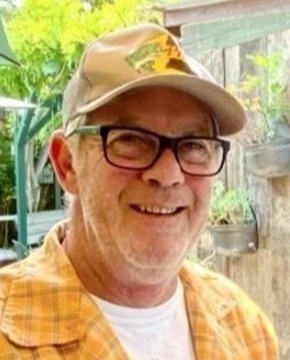 Family and friends are mourning the loss of beloved uncle and trusted friend, Bob Salter, who passed away at his Santa Cruz home with his loving family at his bedside. Bob was born in Santa Cruz to Frederick Salter and Fern Rianda Salter, he attended Delaveaga, B40, and Harbor High School. His father taught Bob the joy of fishing and love of the Sea. He grew up surfing and fishing with his brother Gary. His former boat was the Francis Jolene in the Santa Cruz Harbor. He fished for many seasons in Alaska and would visit family in Canada along the way. Bob had a lifelong career of commercial fishing and most recently fished out of Santa Cruz Harbor with Rick Ryan and his niece Bonnie Salter. >>click to read<< 10:27
Family and friends are mourning the loss of beloved uncle and trusted friend, Bob Salter, who passed away at his Santa Cruz home with his loving family at his bedside. Bob was born in Santa Cruz to Frederick Salter and Fern Rianda Salter, he attended Delaveaga, B40, and Harbor High School. His father taught Bob the joy of fishing and love of the Sea. He grew up surfing and fishing with his brother Gary. His former boat was the Francis Jolene in the Santa Cruz Harbor. He fished for many seasons in Alaska and would visit family in Canada along the way. Bob had a lifelong career of commercial fishing and most recently fished out of Santa Cruz Harbor with Rick Ryan and his niece Bonnie Salter. >>click to read<< 10:27
U.S. regulators will review car-tire chemical that kills salmon, upon request from West Coast tribes
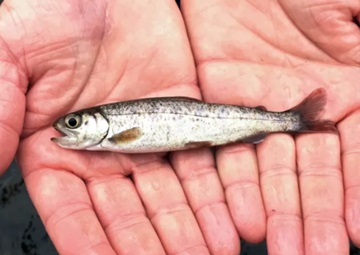 U.S. regulators say they will review the use of a chemical found in almost every tire after a petition from West Coast Native American tribes that want it banned because it kills salmon as they return from the ocean to their natal streams to spawn. The Yurok tribe in California and the Port Gamble S’Klallam and Puyallup tribes in Washington asked the Environmental Protection Agency to prohibit the rubber preservative 6PPD earlier this year, saying it kills fish — especially coho salmon — when rains wash it from roadways into rivers. Washington, Oregon, Vermont, Rhode Island and Connecticut also wrote the EPA, citing the chemical’s “unreasonable threat” to their waters and fisheries. >>click to read<< 10:14
U.S. regulators say they will review the use of a chemical found in almost every tire after a petition from West Coast Native American tribes that want it banned because it kills salmon as they return from the ocean to their natal streams to spawn. The Yurok tribe in California and the Port Gamble S’Klallam and Puyallup tribes in Washington asked the Environmental Protection Agency to prohibit the rubber preservative 6PPD earlier this year, saying it kills fish — especially coho salmon — when rains wash it from roadways into rivers. Washington, Oregon, Vermont, Rhode Island and Connecticut also wrote the EPA, citing the chemical’s “unreasonable threat” to their waters and fisheries. >>click to read<< 10:14

Wood and colleagues visit East Coast offshore wind project
“We as state legislators have a critical and essential role in fostering the offshore wind market in California by developing policies that support procurement and development, investment in ports and supply chains, and strategies and policies for maximizing local economic development,” said Wood. “We wanted to visit Massachusetts and attend this conference to learn what needs to be done and how to do it successfully. California has a number of key stakeholders and we need to make sure we are all rowing in the same direction, with the wind behind us, so to speak, avoiding any headwinds.” >>click to read<< 07:57
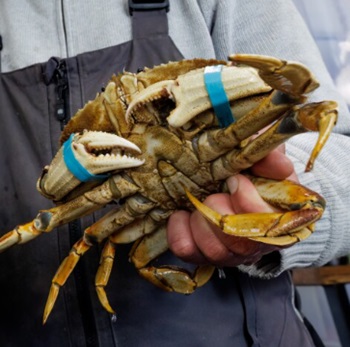
Dungeness crab season delayed again this year, another blow to Santa Cruz fishing industry
Commercial Dungeness crab season had been set to open Nov. 15, but amid concerns about whale safety that have delayed the season in recent years, the California Department of Fish & Wildlife has pushed it back to at least Dec. 1. “For many fishermen, this means there’s no income right now,” one veteran says, “and they’re hanging by the threads.” “It’s really bad,” said Tim Obert of the conditions for local commercial fishermen. “This is the worst year I’ve seen before. We have always had the salmon to back up the crab.” “For many fishermen, this means there’s no income right now and they’re hanging by the threads,” he said. “However, we’re kind of used to it now.” >>click to read << 12:46
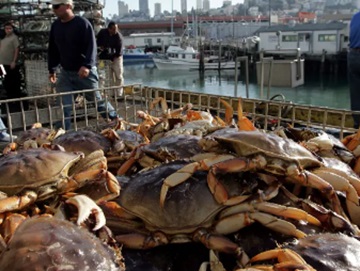
California commercial Dungeness crab season delayed
California’s commercial Dungeness crab seasons will be delayed this year, the California Department of Fish & Wildlife announced Friday. The delays are being enacted in order to protect whales from becoming entangled in crab traps. The opening of the commercial Dungeness crab fishing season will be delayed in Fishing Zones 3, 4, 5, and 6, an area of the state’s coastline that stretches from the Sonoma/Mendocino County line to the U.S.A.-Mexico border. The delay is due to a large number of humpback whales in the area. >>click to read<< 17:33
Boatyard Offers Assistance to Commercial Fishermen Hampered by Regulations
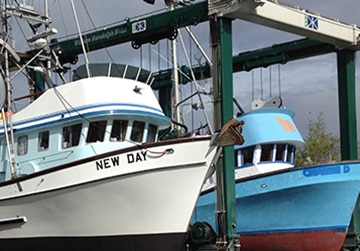 KKMI Boatyard Offers Assistance to Commercial Fishermen Reeling in the bad taste of lost revenue. KKMI announced today they will be offering free haulouts to commercial fishing vessels, giving this hard-hit industry some much needed financial relief after a cancelled salmon season made it quite difficult to eke out a living. This offer is good at both KKMI locations on the San Franciso Bay – Richmond and Sausalito. We are in a position to help out and we are honored to be able to do so,” said KKMI Founder, Paul Kaplan. >>click to read<< 08:16
KKMI Boatyard Offers Assistance to Commercial Fishermen Reeling in the bad taste of lost revenue. KKMI announced today they will be offering free haulouts to commercial fishing vessels, giving this hard-hit industry some much needed financial relief after a cancelled salmon season made it quite difficult to eke out a living. This offer is good at both KKMI locations on the San Franciso Bay – Richmond and Sausalito. We are in a position to help out and we are honored to be able to do so,” said KKMI Founder, Paul Kaplan. >>click to read<< 08:16
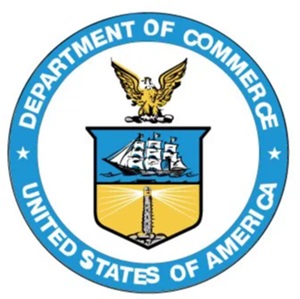
Struggling salmon fishermen getting federal help, but it may be too late
Earlier this month, two years after a request by Oregon’s governor, the U.S. Department of Commerce declared a Chinook fishery disaster for 2018, 2019 and 2020, years when local salmon populations plummeted. Fishing regulators blame the drop on poor habitat conditions and climate change near the California-Oregon border, where thousands of Chinook migrate from the ocean up rivers and streams to spawn. The disaster declaration releases financial assistance for fishermen and possibly for other businesses, along with funding to help restore the fishery and protect future Chinook runs, members of Oregon’s congressional delegation said in a statement. “The powers that be move pretty slowly when it comes to this stuff,” said Ray Monroe, a Pacific City dory fisherman. >>click to read<< 12:00
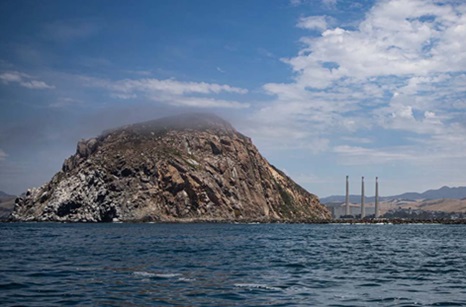
Some Morro Bay Residents Are Dead Set Against CA’s Offshore Wind Farms
Joey Racano used to have a dining room table. Now the sunlit nook off the family kitchen more often than not serves as a conference room. The table is covered with maps, thick binders bulging with tech reports, towers of meeting minutes, abandoned coffee mugs — the accumulation of years of community vigilance. On this day, his home is a lively place where a handful of locals are discussing one of California’s most complex and audacious initiatives — loading the Pacific Ocean with sprawling wind farms that float 20 miles from shore. “This is just another attempt to industrialize the coast,” said Rachel Wilson, who lives in Cayucos, a tiny, old-fashioned beach town, and regularly attends public meetings about the wind projects. “I can just see Port Hueneme with cranes and lights and a huge wharf in my charming little coastal community. No way.” >>click to read<< 08:37
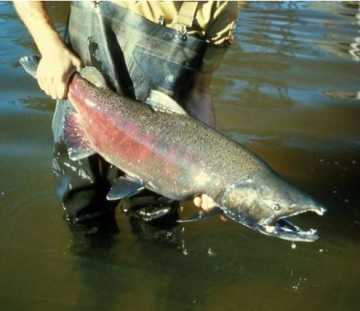
With salmon at risk of extinction, California begins urgent rescue effort
Typically, now is the time when creeks along the Sacramento River are filled with young spring-run Chinook salmon preparing to make their journey downstream to the Pacific Ocean, where they will mature, and eventually make their return to California spawning sites. This year, however, the salmon population has plummeted alarmingly—what officials call a “cohort collapse”—and biologists are taking urgent measures to save them from extinction. For the first time, biologists with the California Department of Fish and Wildlife and the National Oceanic and Atmospheric Administration have begun capturing the juvenile spring-run salmon so that they can breed them in captivity, and hopefully prevent them from disappearing from the wild. For the first time, biologists with the California Department of Fish and Wildlife and the National Oceanic and Atmospheric Administration have begun capturing the juvenile spring-run salmon so that they can breed them in captivity, and hopefully prevent them from disappearing from the wild. >>click to read<< 13:25
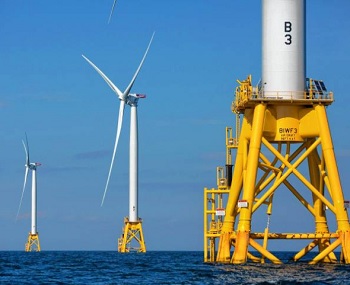
New California law aims to speed up offshore wind development
A law signed by California Governor Gavin Newsom on Saturday aims to speed up the process for new offshore wind development. The law requires California’s Coastal Commission to process consolidated permits for coastal development, which the law’s main sponsor says will streamline permitting. His district includes Mendocino, Trinity and Humboldt counties. McGuire said in a press release that this law will slash five years off the normal permitting timeline for offshore wind projects. He said it will help the state meet its goals in terms of climate change and renewable energy. >>click to read<< 09:31
The Western Flyer Returns Home to Monterey!
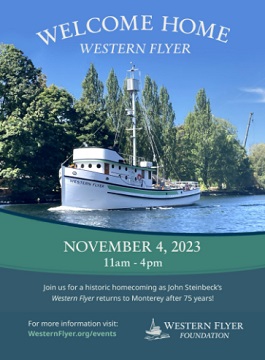 She’s coming home at last! After being away for 75 years, the historic Western Flyer—the sardine fishing boat immortalized by John Steinbeck’s 1951 classic The Log from the Sea of Cortez—will return to her home port of Monterey on Saturday, November 4th. “The Western Flyer was built for Monterey’s sardine fishery in 1937, and while it gained notoriety from its 1940 research trip with John Steinbeck and Ed Ricketts, it’s had a long and storied past as a fishing boat,” said marine geologist John Gregg, founder and board member of the Western Flyer Foundation. “Now restored with a hybrid diesel-electric engine and state-of-the-art marine lab, the Flyer symbolizes a bridge, linking Monterey’s commercial fishing heritage with its leadership in marine science and education.” When Gregg purchased the Western Flyer in 2015, the neglected 77-foot fishing vessel had sunk several times and was almost beyond repair. >>click to read<< 07:50
She’s coming home at last! After being away for 75 years, the historic Western Flyer—the sardine fishing boat immortalized by John Steinbeck’s 1951 classic The Log from the Sea of Cortez—will return to her home port of Monterey on Saturday, November 4th. “The Western Flyer was built for Monterey’s sardine fishery in 1937, and while it gained notoriety from its 1940 research trip with John Steinbeck and Ed Ricketts, it’s had a long and storied past as a fishing boat,” said marine geologist John Gregg, founder and board member of the Western Flyer Foundation. “Now restored with a hybrid diesel-electric engine and state-of-the-art marine lab, the Flyer symbolizes a bridge, linking Monterey’s commercial fishing heritage with its leadership in marine science and education.” When Gregg purchased the Western Flyer in 2015, the neglected 77-foot fishing vessel had sunk several times and was almost beyond repair. >>click to read<< 07:50
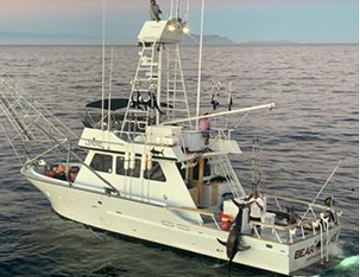
First permits issued for swordfish captains in California
The first commercial fishing permits for the use of deep-set buoy gear in the swordfish fishery in the US state of California were issued by the National Marine Fisheries Service on September 15, marking a significant transition from the large nets that drifted off the West Coast. Gillnets will finally disappear by 2027, replaced mostly by deep-set buoy gear — vertical lines about 150 fathoms long, with a flagpole with a light or radar reflector on top and a bug- and sinker to keep the line anchored vertically. Main lines usually have one to three round hooks with a light attached to shine below the thermocline in 20 to 70 meters (65 to 230 feet) of California water. The gear is designed to be actively maintained, with strike indicators on the surface to alert anglers when a fish is present. >>click to read << 16:23
Fisherman statue will remain, Eureka mayor says in letter to PETA
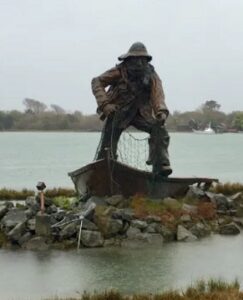 The People for the Ethical Treatment of Animals urged Eureka Mayor Kim Bergel to remove the iconic Fisherman Memorial statue from Woodley Island. Both PETA and Bergel shared letters addressing the issue. Here’s what the letters said. The following is a letter from PETA’s president to Eureka Mayor Kim Bergel: Dear Mayor Bergel: I’m writing on behalf of People for the Ethical Treatment of Animals—PETA entities have more than 9 million members and supporters globally, including many who are lucky enough to live in California—with a fintastic suggestion. >>click to read<< 10:15
The People for the Ethical Treatment of Animals urged Eureka Mayor Kim Bergel to remove the iconic Fisherman Memorial statue from Woodley Island. Both PETA and Bergel shared letters addressing the issue. Here’s what the letters said. The following is a letter from PETA’s president to Eureka Mayor Kim Bergel: Dear Mayor Bergel: I’m writing on behalf of People for the Ethical Treatment of Animals—PETA entities have more than 9 million members and supporters globally, including many who are lucky enough to live in California—with a fintastic suggestion. >>click to read<< 10:15
Bay Area commercial fishers struggling under weight of recent catch restrictions
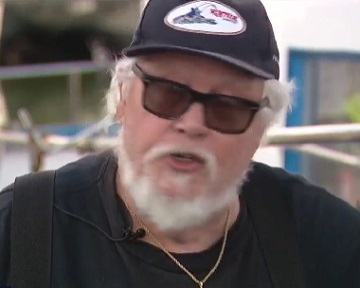 Bay Area commercial fishers say they are facing unprecedented financial hardships this year after dealing with a range of restrictions on several of their key catches. “I’m struggling to pay my bills. I’m definitely going to be in the red this year,” said William “Captain Smitty” Smith, who has commercially fished and run charters out of Half Moon Bay since 1985. Smith says he has been hit hard by the State’s decision to cancel salmon season off the coast for the first time in 14 years. “My overall business for the year, is down 90 percent,” said Smith. “The salmon is one of the major mainstays of this whole harbor. If you look across, every boat is here, every boat is tied up. These guys have got mortgages to pay, got bills to pay,” said Smith. Video, >>click to read<< 10:15
Bay Area commercial fishers say they are facing unprecedented financial hardships this year after dealing with a range of restrictions on several of their key catches. “I’m struggling to pay my bills. I’m definitely going to be in the red this year,” said William “Captain Smitty” Smith, who has commercially fished and run charters out of Half Moon Bay since 1985. Smith says he has been hit hard by the State’s decision to cancel salmon season off the coast for the first time in 14 years. “My overall business for the year, is down 90 percent,” said Smith. “The salmon is one of the major mainstays of this whole harbor. If you look across, every boat is here, every boat is tied up. These guys have got mortgages to pay, got bills to pay,” said Smith. Video, >>click to read<< 10:15
Cancelation of California salmon season forces fishermen to find new way forward
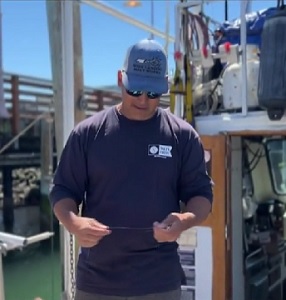 Salmon fishers across the state are pivoting to stay afloat after the salmon fishing season was canceled earlier this year. At dock 47 in San Francisco, the pier looks different this time of year. More boats are tied up, an unusual sight for what would be peak salmon season. Matt Juanes is preparing to head out to sea. He readies his lines and hopes for a big catch. For now, it’s all he can do. “My goal is to catch every last one of them,” he said aboard his boat Plumeria. But this year, the salmon fisher of 8 years is exploring uncharted territory for him. He’s now looking to catch shrimp and halibut after salmon season was canceled for repopulation efforts. Video, >click to read< 09:03
Salmon fishers across the state are pivoting to stay afloat after the salmon fishing season was canceled earlier this year. At dock 47 in San Francisco, the pier looks different this time of year. More boats are tied up, an unusual sight for what would be peak salmon season. Matt Juanes is preparing to head out to sea. He readies his lines and hopes for a big catch. For now, it’s all he can do. “My goal is to catch every last one of them,” he said aboard his boat Plumeria. But this year, the salmon fisher of 8 years is exploring uncharted territory for him. He’s now looking to catch shrimp and halibut after salmon season was canceled for repopulation efforts. Video, >click to read< 09:03
Hurricane Hilary Poses Unusual Threat to Southern California
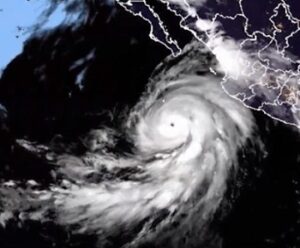 Hurricane Hilary is charting a rare path to Southern California. The storm is currently a Category 4 hurricane, the second-highest level. After bringing heavy rains and a dangerous storm surge to the west coast of Mexico’s Baja California peninsula over the weekend, Hilary is expected to weaken to a tropical storm before it reaches the U.S. Sunday evening. Nevertheless, it is forecast to bring severe weather to an area unaccustomed to tropical storms. The hurricane’s predicted path is due to an unusual convergence of warm water, a high-pressure zone to the east and a jet stream to the west, according to Dan DePodwin, AccuWeather’s director of forecasting operations. “You have to have the exact right atmospheric setup,” said DePodwin. “And that’s what we have.” Video, >click to read< 08:05
Hurricane Hilary is charting a rare path to Southern California. The storm is currently a Category 4 hurricane, the second-highest level. After bringing heavy rains and a dangerous storm surge to the west coast of Mexico’s Baja California peninsula over the weekend, Hilary is expected to weaken to a tropical storm before it reaches the U.S. Sunday evening. Nevertheless, it is forecast to bring severe weather to an area unaccustomed to tropical storms. The hurricane’s predicted path is due to an unusual convergence of warm water, a high-pressure zone to the east and a jet stream to the west, according to Dan DePodwin, AccuWeather’s director of forecasting operations. “You have to have the exact right atmospheric setup,” said DePodwin. “And that’s what we have.” Video, >click to read< 08:05
NOAA Recommends $106.1 Million in funding for West Coast and Alaska salmon recovery
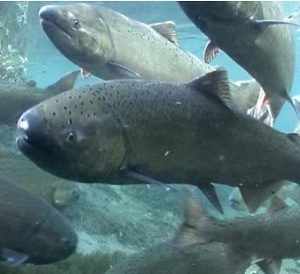 Today, the Department of Commerce and NOAA announced more than $106 million in recommended funding for 16 West Coast and Alaska state and tribal salmon recovery programs and projects under the Pacific Coastal Salmon Recovery Fund (PCSRF). The funds, including $34.4 million under the Bipartisan Infrastructure Law and $7.5 million under the Inflation Reduction Act, will support the recovery, conservation and resilience of Pacific salmon and steelhead in Alaska, California, Idaho, Oregon and Washington. This funding is part of President Biden’s historic Investing in America agenda, which includes over $2 billion for fish passage investments across the country. >click to read< 18:03
Today, the Department of Commerce and NOAA announced more than $106 million in recommended funding for 16 West Coast and Alaska state and tribal salmon recovery programs and projects under the Pacific Coastal Salmon Recovery Fund (PCSRF). The funds, including $34.4 million under the Bipartisan Infrastructure Law and $7.5 million under the Inflation Reduction Act, will support the recovery, conservation and resilience of Pacific salmon and steelhead in Alaska, California, Idaho, Oregon and Washington. This funding is part of President Biden’s historic Investing in America agenda, which includes over $2 billion for fish passage investments across the country. >click to read< 18:03
Del Norte Fishermen Are Pissed About Nearshore Groundfish Fishery Closure
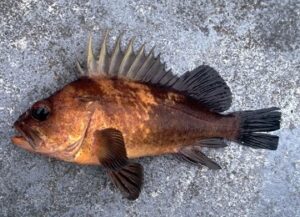 Del Norte County fishermen say a California Department of Fish and Wildlife decision to close the nearshore groundfish fishery in the north part of the state starting next week could economically devastate the community. At least seven appeared before the local Fish and Game Advisory Commission on Monday, urging commissioners to send a letter to the agency as well as state representatives Mike McGuire and Jim Wood. The information CDFW scientists used to close the near-shore groundfish fishery comes from the recreational estimated catch of quillback rockfish as well as estimates from the commercial fishery within the Northern Groundfish Management Area, she said Tuesday. The Northern GMA stretches from about Cape Mendocino to the California-Oregon border. >click to read< 07:46
Del Norte County fishermen say a California Department of Fish and Wildlife decision to close the nearshore groundfish fishery in the north part of the state starting next week could economically devastate the community. At least seven appeared before the local Fish and Game Advisory Commission on Monday, urging commissioners to send a letter to the agency as well as state representatives Mike McGuire and Jim Wood. The information CDFW scientists used to close the near-shore groundfish fishery comes from the recreational estimated catch of quillback rockfish as well as estimates from the commercial fishery within the Northern Groundfish Management Area, she said Tuesday. The Northern GMA stretches from about Cape Mendocino to the California-Oregon border. >click to read< 07:46
Commercial Fisherman Fredrick (Fred) Reno Italo Arnoldi of Morro Bay, has passed away
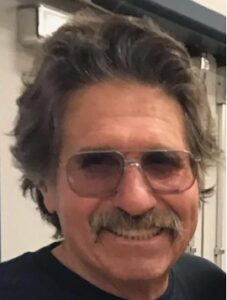 Fred left on his Eternal Hunting and Fishing Trip in the early morning hours on June 27, 2023, passing peacefully in his home in Morro Bay, with his wife Diane and his sister Janice by his side. Fred was born January 3, 1951 raised in Santa Barbara where he attended Lincoln Elementary School, La Cumbre Junior High School, and Santa Barbara High School 1970. He left Santa Barbara to become a commercial fisherman up until his last day on earth. He fished salmon in Alaska and the South Seas. Fred seined in San Pedro, and fished herring in San Francisco. Fred owned several vessels including Drifter, Halcyon, Roselena Marie, H2O K-9 and Amakua. A Celebration of Life will be held August 19 from 11:00 AM to 3:00 PM at the Veteran’s Memorial Building, 209 Surf Street, Morro Bay. All are invited. >click to read< 09:51
Fred left on his Eternal Hunting and Fishing Trip in the early morning hours on June 27, 2023, passing peacefully in his home in Morro Bay, with his wife Diane and his sister Janice by his side. Fred was born January 3, 1951 raised in Santa Barbara where he attended Lincoln Elementary School, La Cumbre Junior High School, and Santa Barbara High School 1970. He left Santa Barbara to become a commercial fisherman up until his last day on earth. He fished salmon in Alaska and the South Seas. Fred seined in San Pedro, and fished herring in San Francisco. Fred owned several vessels including Drifter, Halcyon, Roselena Marie, H2O K-9 and Amakua. A Celebration of Life will be held August 19 from 11:00 AM to 3:00 PM at the Veteran’s Memorial Building, 209 Surf Street, Morro Bay. All are invited. >click to read< 09:51






